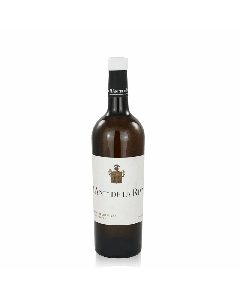WHITE WINE
-
 M. Ant De La Riva 'La Riva' Palomino de Pasto pagos Marcharnudos 2017
M. Ant De La Riva 'La Riva' Palomino de Pasto pagos Marcharnudos 2017M. Antonio de la Riva (by Willy Peréz and Ramiro Ibañez)
Manuel Antonio de la Riva founded his Jerez bodega in 1858. Located on the famous Arcos Street in Jerez, La Riva enjoyed great success with wines sourced from Manuel's vineyards in Pago Marcharnudo. More than a century later (after Manuel's death), it was bought by Domecq, who added La Riva to some of their best wines. With the decline and devaluation of Jerez after the 1960s, Domecq slowly began eliminating brands and La Riva ceased to exist; the brand names were sold to Beam International.Before the end of La Riva, young winemaker Luis Pérez (who later founded Bodegas Luis Pérez) had started working as a winemaker in several of the Domecq subsidiaries: Blázquez, Florido, Hermanos y Sancho and … La Riva! Luis learned the vineyards, practices and wines of the La Riva brands just before they were deleted. With the historical knowledge of Luis to guide them, next generation winemakers Willy Pérez (son of Luis) and Ramiro Ibáñez decided to recuperate the brand and its historical wines before they became entirely forgotten. Willy and Ramiro bought back the rights to the La Riva brands in 2017, and have since negotiated access to some of the famous plots from which they were sourced (and which had since become anonymous fruit sources for un-aspirational Sherries), in Balbaina Alta, and particularly Macharnudo.
M.ANTONIO de la RIVA Macharnudo Palomino de Flor con asoleado
La Riva Macharnudo Blanco recuperates a great wine based in the 'el Majuelo' vineyard (specifically in the tiny sub-vineyard parcela, el notario) within Pago Macharnudo[1]; a historical wine of el Marco de Jerez which disappeared under Domecq in the 1980s. 'El Notario' faces north (just under el Castillo de Majuelo, a castle crowning the pago) at 115m altitude, 18km in from the Atlantic, in a mixed poniente-levante setting. The soils are Tosca cerrada and barajuelas with a high level of diatomaceous fossils promoting great freshness. The fruit (Palomino 84) is hand-picked, with individual bunches selected in repeated passes over 2 months, which gain a degree or so of alcohol from an 8 hour soleo. It's then whole bunch pressed (only half the juice is taken). An ambient spontaneous fermentation in 600l bota precedes 20 months ageing under a film of flor. 1,500 bottles were filled in May 2019 at 14% abv, 5.5 ta, and neither filtered nor fined. It faithfully reflects the origin and style of the structured white wine elaborated under this brand in the past. THE SPANISH ACQUISTION2017PalominoSpain410$155.00 As low as $139.50 -
 Callejuela Blanco de Hornillos Palomino 2021
Callejuela Blanco de Hornillos Palomino 2021More product information will be added here soon! In the meantime, if you do have any questions at all about this product or others in our store, you can contact us by phone or email. Our friendly and experienced team are always happy to assist - we love drinking, selling, talking about and being in and around wine!
2021PalominoSpain410$38.00 As low as $34.20 -
 Corta y Raspa Palomino de Pasto Parcela los Esbarataos
Corta y Raspa Palomino de Pasto Parcela los EsbarataosA wine of good volume with nice stretch, saline freshness and a sense of Miraflores open fluidity. Good skin concentration plays out as pickled cumquats, with old marigolds, a lick of chalk and smoky blue steel. In the run home, it turns deftly sour, running out on a lovely bitter herb tisane. The gentle release approximates a smile. THE SPANISH ACQUISITION
2020PalominoSpain410$52.00 As low as $46.80 -
 Luis Perez el Muelle Palomino 2022
Luis Perez el Muelle Palomino 2022El Muelle is named for a pier which used to serve fishing boats in Sanlúcar de Barrameda. It’s ‘nominally’ a Vino de Pasto, a wine with some bodega ageing development, but short of the requirements for Fino. In the case of ‘el Muelle’, it’s a Vino de Pasto very lightly touched by ageing.
El Muelle is a structured, detailed rich and savoury wine, part of which is given a brief soleo. It’s fermented and aged in a mix of stainless steel (80-90%) and bota. Only a small portion develops flor. Both portions spend 6 months in tank to unify. The wine is naturally acidified with addition of a light ‘green wine’ fermented from the green harvest in July.
Somewhat tropical fruit, with peach, apple, and pear. After release, this fruit resolves into citrus and chalk. There's a touch of plumpness, then toast, cereal, and floral aspects in balance, with the false sweetness of chalk filling out the flowers. Savoury and long, with the feel of chalk and lovely structural definition.
2018PalominoSpain410$48.00 As low as $43.20 -
 Luis Perez Palma 'Caberrubia' Saca VII Fino 2022
Luis Perez Palma 'Caberrubia' Saca VII Fino 2022More product information will be added here soon! In the meantime, if you do have any questions at all about this product or others in our store, you can contact us by phone or email. Our friendly and experienced team are always happy to assist - we love drinking, selling, talking about and being in and around wine!
2018PalominoSpain410$140.00 As low as $126.00

